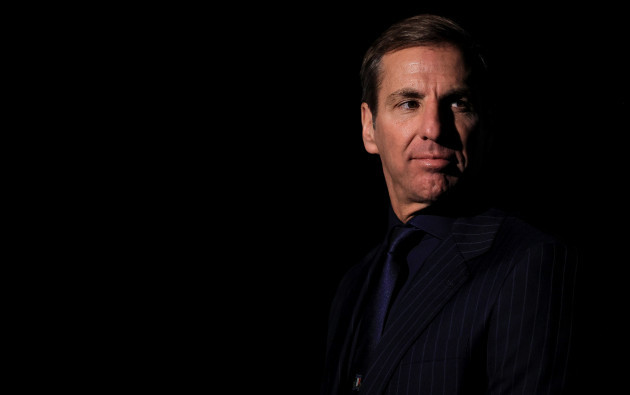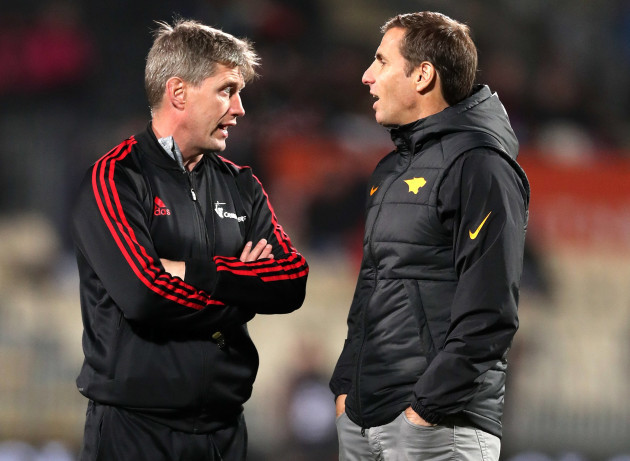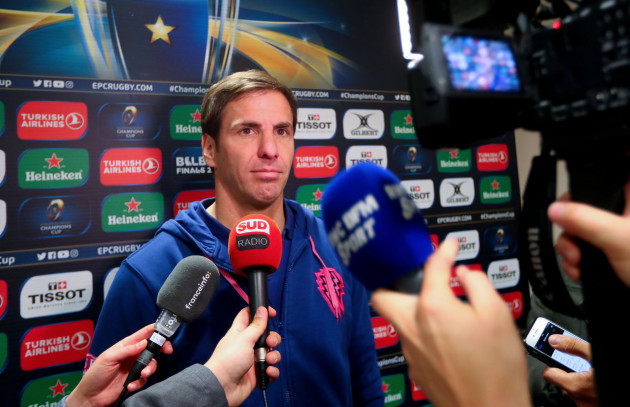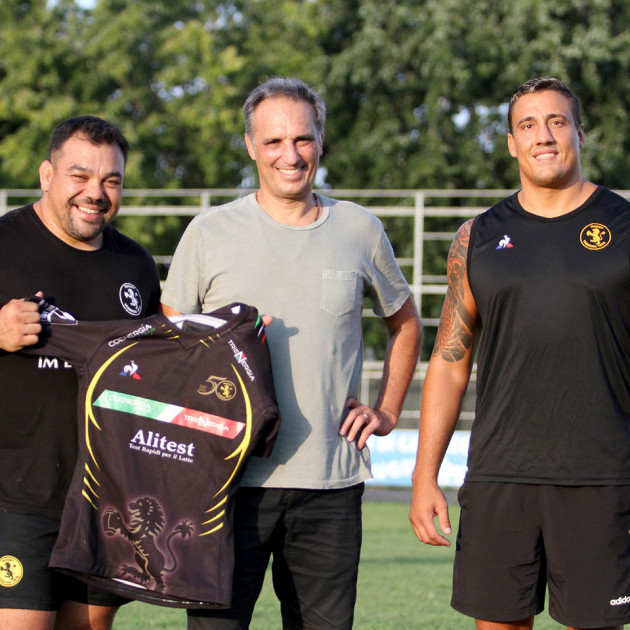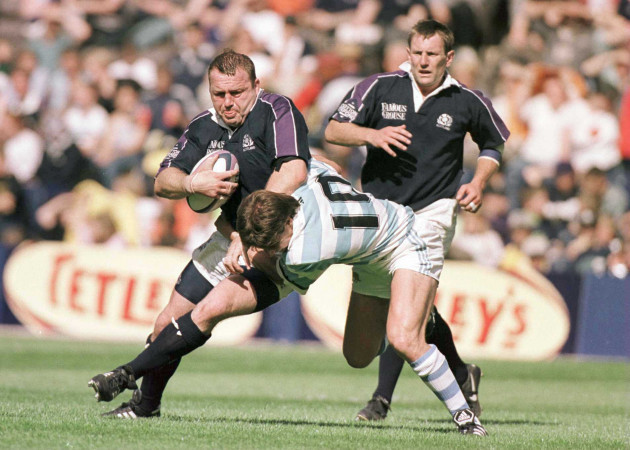GROWING UP IN ARGENTINA, the start of the Five Nations championship would mark the end of Gonzalo Quesada’s summer holidays.
Quesada’s hometown of Buenos Aires is only three hours behind Ireland and Britain — and four back from France — so by the early Saturday kick-off in the early ’80s, the day was well underway around him. Too much so, in fact.
Quesada would close the window shutters in the family home so that he could blast the anthems as they rang out from Murrayfield or Lansdowne Road or the Parc des Princes, inhaling the games from the darkness of his makeshift cinema while the sun split the stones outside.
All of which explains Quesada’s conspicuous pride when he points out — as he has ad nauseam since being announced as Kieran Crowley’s successor last June — that he is the first Argentinian to take charge of any constituent nation in the championship’s 141-year run.
And however unenviable the task awaiting his side on the field, the thought of leading Italy to Dublin this week must have drawn a similarly wry smile from their 49-year-old head coach.
The last time Quesada prepared for a test match in the Irish capital, he stayed in a hotel room that had been provisionally booked for David Humphreys.
Four days before that 1999 Rugby World Cup quarter-final with France at Landsdowne Road, Argentina had in Lens eliminated Warren Gatland’s Ireland in what was, for its time, a stunning upset.
Out-half Quesada not only kicked every point outside of Diego Alabanese’s late try in Los Pumas’ 28-24 victory, but he booted Irish rugby so firmly up the arse that it later crash-landed into the professional era by dint of sheer embarrassment.
Argentina, meanwhile, landed into a West Dublin hotel that had been decked out in the hue of the home quarter-finalists who never were.
Though Argentina would fall to France in the last eight, eventually finishing fifth, Los Pumas had made themselves known to the rugby world.
So too had their previously unheralded out-half from Buenos Aires’ Hindú club.
The 25-year-old Quesada, who had seen off the challenges of legacy Puma José Cilley and future legend Felipe Contepomi to make the 10 shirt his own before the tournament, finished as the top scorer at the ’99 World Cup with 102 points. He averaged over 20 points per game and his 31 successful kicks (out of a possible 36, giving him an 82% success rate) remain a World Cup record.
Quesada was subsequently honoured with the ‘Olimpia de Oro’, Argentina’s award for the nation’s most important sportsperson of the year. He is one of just three rugby players to have won the award in its 70-year history, and remains the most recent.
During the World Cup, Quesada had been christened ‘Speedy Gonzalo’ by the English-speaking media, a sarcastic allusion to the agonising amount of time for which he pored over every place kick. In Argentina, he came to be more affectionately known as ‘Queso’.
Now, he’s Italian rugby’s big cheese.
Quesada made quite the impression on Azzurri rugby fanatics when he was first officially unveiled at the Olympic Committee offices in Rome back in November. He held a 90-minute press conference in Italian despite having only begun to learn the language a couple of months prior.
Fluency in the language of the men he has been hired to lead is an element of the job upon which Quesada is insistent. It’s the first piece of advice he gives to foreign coaches who aspire to work in France, where Quesada has spent most of the last 24 years as a player and coach.
At the Six Nations launch in Dublin a fortnight ago, Quesada acted as his own translator, fielding top-table questions and taking one-on-one interviews in three languages, none of which were his own.
In Italian, English and French, he politely reminded unacquainted journalists that while he was a first-time international head coach, 2024 would be far from his first rodeo in the Six Nations.
Indeed, Quesada was a kicking coach for Marc Lièvremont’s France between 2008 and 2011. They won a Slam in 2010 and reached the World Cup final in New Zealand a year later — albeit by that stage, the players were ostensibly self-governed.
It was quite the baptism of fire, though, for Quesada, who upon the inevitable dissolution of Lièvremont’s coaching ticket was hired by Racing as their backs coach for the 2011/12 season. There wasn’t much by way of a bedding-in process; amid further tumult at the top, Quesada was promoted to head coach for the following campaign.
He swapped Racing for Parisian rivals Stade Francais in the summer of 2013, exceeding expectations in leading Les Stadistes to a Top 14 title in just his second season in charge. A Challenge Cup success followed in 2017.
Then came the misadventure that was Quesada’s season at the helm of sleeping giants Biarritz, whose longtime financial woes saw them booted down to France’s third tier despite Quesada’s sixth-placed finish in Pro D2. Upon the appointments of a new president and a new director of rugby at the Basque club in 2018, Quesada was freed from his contract two years early.
He returned to Argentina, succeeding Mario Ledesma as head coach of Super Rugby outfit Jaguares while moonlighting as Ledesma’s assistant coach with Los Pumas. It was all part of a Unión Argentina de Rugby (UAR) strategy to align its senior men’s national team with the club which boasted most of its players ahead of the following year’s World Cup in Japan.
Quesada led Jaguares to the 2019 Super Rugby final, in which they lost 19-3 to Scott Robertson’s Crusaders in Christchurch. At the World Cup later that year, however, Argentina were unable to match the success of their flagship franchise — or even that of a similar model deployed by Japan and the Sunwolves. They exited at the first hurdle after finishing behind England and France in their pool.
Soon afterwards, Jaguares were finished, too: Covid-19 blew the very concept of Super Rugby asunder and, in the summer of 2020, Quesada headed back to Europe to replace Heyneke Meyer at Stade, albeit this time around he endured a less fruitful three seasons than his previous reign.
But aside from how much he’s already packed into his coaching career at just 49, perhaps the most remarkable aspect of Quesada’s CV is that it contains no gaps: he has worked continuously as a full-time coach in some of rugby’s most pressurised environments for 17 years, his only breaks coming during off-seasons.
This is one of the reasons why the FIR saw Quesada as an upgrade on predecessor Crowley. The Kiwi is undoubtedly a high-level coach who progressed Italy’s game and steered them to some of their most famous results in the professional era, but the Azzurri gig was by far the most significant undertaking of his career. As illustrated during Netflix’s recent Full Contact documentary, there were times in which that became evident both privately and publicly.
Leading Italy is the biggest job of Quesada’s career, too, but a coach who has survived the relentless, week-to-week grind at the top end of French rugby for 15-odd years will find the scrutiny he faces in his new role almost sedative by comparison.
Pull the curtain back a bit further and it seems likely that Quesada was on the FIR’s radar for at least a couple of years before his eventual hiring.
In August 2020, Italian rugby quietly welcomed into its fold one of the masterminds behind Argentinian rugby’s modern-day development, Germán Fernández — a former colleague of Quesada’s at Jaguares.
Fernández took charge of Viadana in Italy’s Top10 domestic league, having previously served as UAR’s High Performance skills coach for a decade from 2008, and as Argentina’s head of Academies and High Performance from 2018 until 2020.
Among Fernández’s areas of expertise back in the motherland were the identification of raw talent across Argentina’s vast expanses and the gradual development of that talent into test-quality players. He played a key role in the careers of several of today’s Puma stars, including that of captain Julián Montoya.
Through his lens at Viadana, Fernández staked out the Italian scene for two years before being appointed the technical director of Italian youth rugby in July 2022, succeeding impressive Dubliner Stephen Aboud whose face didn’t seem to fit the vision laid out by new FIR president Marzio Innocenti.
Last month, it was confirmed that Fernández will also join Italy’s senior coaching team as a breakdown specialist, creating an alignment between Italy’s new youth structures and the senior national team.
Fernández is one of the very few additions to a support staff left behind by Crowley and retained by Quesada ahead of his first Six Nations. That lack of turnover shows that both Quesada and the Italian federation believe the foundations laid by Crowley in the senior team remain solid despite their taking a heavy shelling at the World Cup.
But the progression of Fernández in particular lays bare the bigger picture: Innocenti intends to replicate Argentina’s rugby infrastructure as Italy attempt to gain their own seat at the cool boys’ table.
It will help Quesada’s more immediate cause that he has taken charge of a team from a Latin country. The new Azzurri boss describes himself as a coach who thinks “like an Anglo-Saxon” but behaves with the outward passion of an Argentinian.
Quesada speaks of a team’s ‘identity’ differently to other coaches in that he means it literally. He intends to harness in his team the traits that Italian people share with his own — the emotion, the intensity, that little amalgamation of magic and madness — and complement it with sophisticated game-plans.
There is a touch of the Joe Schmidts about Quesada’s predilection towards elaborate, effective strike plays. The kicking game, too, which has been a problem endemic to the Azzurri for 25 years and these days goes a long way towards determining test results, will naturally be an area in which the former out-half will believe he can elevate his side.
But Quesada is equally obsessed with another of Italy’s traditional weaknesses: defence.
At Jaguares, he and his staff implemented a system they called ‘ITE’: Interno (Internal), Tackleador (Tackler), and Externo (External).
‘Internal’ meant that a defender must have an absolute understanding of his defensive responsibilities as an individual, whatever the in-game situation. ‘Tackler’ was mostly self-explanatory, with a focus on winning the gain-line. And ‘External’ meant that a defender must have an absolute understanding of every other player’s defensive responsibilities as well as their own, to cover for the event that they would have to fill in.
It was a simple, research-intensive concept but it took Jaguares a long way. They conceded just three tries across their three Super Rugby play-off games in 2019 — one in each game, including in the final away to Crusaders.
With Italy’s attack already in a pretty good spot, it may be on the other side of the ball that Quesada exerts the most energy during his first campaign in charge.
His second game will take him back to Dublin, where the Italians will be both buoyed and insulted in equal measure by the reality that Ireland believe they can still win the game while rotating their matchday 23 to an extent unprecedented in Andy Farrell’s previous four championships.
And Ireland are probably right. Warren Gatland, meanwhile, might be more spooked on the final weekend when he is reunited with the Argentinian out-half who inflicted upon him one of the darkest days of his coaching career 25 years earlier.


